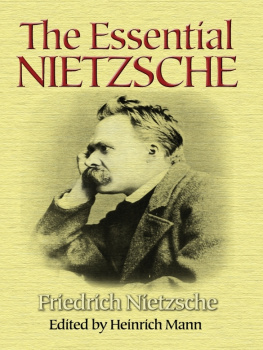Friedrich Wilhelm Nietzsche - Thus Spake Zarathustra: A Book for All and None
Here you can read online Friedrich Wilhelm Nietzsche - Thus Spake Zarathustra: A Book for All and None full text of the book (entire story) in english for free. Download pdf and epub, get meaning, cover and reviews about this ebook. year: 1999, genre: Science. Description of the work, (preface) as well as reviews are available. Best literature library LitArk.com created for fans of good reading and offers a wide selection of genres:
Romance novel
Science fiction
Adventure
Detective
Science
History
Home and family
Prose
Art
Politics
Computer
Non-fiction
Religion
Business
Children
Humor
Choose a favorite category and find really read worthwhile books. Enjoy immersion in the world of imagination, feel the emotions of the characters or learn something new for yourself, make an fascinating discovery.

- Book:Thus Spake Zarathustra: A Book for All and None
- Author:
- Genre:
- Year:1999
- Rating:4 / 5
- Favourites:Add to favourites
- Your mark:
- 80
- 1
- 2
- 3
- 4
- 5
Thus Spake Zarathustra: A Book for All and None: summary, description and annotation
We offer to read an annotation, description, summary or preface (depends on what the author of the book "Thus Spake Zarathustra: A Book for All and None" wrote himself). If you haven't found the necessary information about the book — write in the comments, we will try to find it.
Friedrich Wilhelm Nietzsche: author's other books
Who wrote Thus Spake Zarathustra: A Book for All and None? Find out the surname, the name of the author of the book and a list of all author's works by series.
Thus Spake Zarathustra: A Book for All and None — read online for free the complete book (whole text) full work
Below is the text of the book, divided by pages. System saving the place of the last page read, allows you to conveniently read the book "Thus Spake Zarathustra: A Book for All and None" online for free, without having to search again every time where you left off. Put a bookmark, and you can go to the page where you finished reading at any time.
Font size:
Interval:
Bookmark:
The Project Gutenberg EBook of Thus Spake Zarathustra, by Friedrich Nietzsche
This eBook is for the use of anyone anywhere at no cost and with
almost no restrictions whatsoever. You may copy it, give it away or
re-use it under the terms of the Project Gutenberg License included
with this eBook or online at www.gutenberg.org
Title: Thus Spake Zarathustra
A Book for All and None
Author: Friedrich Nietzsche
Translator: Thomas Common
Release Date: November 7, 2008 [EBook #1998]
Last Updated: November 16, 2016
Language: English
*** START OF THIS PROJECT GUTENBERG EBOOK THUS SPAKE ZARATHUSTRA ***
Produced by Sue Asscher, and David Widger
PG Editors Note:
Archaic spelling and punctuation usages have not been changed from the original. I particular, quotations are often not closed for several paragraphs.
DWCONTENTS
THE THREE METAMORPHOSES.
THE ACADEMIC CHAIRS OF VIRTUE.
BACKWORLDSMEN.
THE DESPISERS OF THE BODY.
JOYS AND PASSIONS.
THE PALE CRIMINAL.
READING AND WRITING.
THE TREE ON THE HILL.
THE PREACHERS OF DEATH.
WAR AND WARRIORS.
THE NEW IDOL.
THE FLIES IN THE MARKET-PLACE.
CHASTITY.
THE FRIEND.
THE THOUSAND AND ONE GOALS.
NEIGHBOUR-LOVE.
THE WAY OF THE CREATING ONE.
OLD AND YOUNG WOMEN.
THE BITE OF THE ADDER.
CHILD AND MARRIAGE.
VOLUNTARY DEATH.
THE BESTOWING VIRTUE.
THE CHILD WITH THE MIRROR.
IN THE HAPPY ISLES.
THE PITIFUL.
THE PRIESTS.
THE VIRTUOUS.
THE RABBLE.
THE TARANTULAS.
THE FAMOUS WISE ONES.
THE NIGHT-SONG.
THE DANCE-SONG.
THE GRAVE-SONG.
SELF-SURPASSING.
THE SUBLIME ONES.
THE LAND OF CULTURE.
IMMACULATE PERCEPTION.
SCHOLARS.
POETS.
GREAT EVENTS.
THE SOOTHSAYER.
REDEMPTION.
MANLY PRUDENCE.
THE STILLEST HOUR.
THE WANDERER.
THE VISION AND THE ENIGMA.
INVOLUNTARY BLISS.
BEFORE SUNRISE.
THE BEDWARFING VIRTUE.
ON THE OLIVE-MOUNT.
ON PASSING-BY.
THE APOSTATES.
THE RETURN HOME.
THE THREE EVIL THINGS.
THE SPIRIT OF GRAVITY.
OLD AND NEW TABLES.
THE CONVALESCENT.
THE GREAT LONGING.
THE SECOND DANCE-SONG.
THE SEVEN SEALS.
THE HONEY SACRIFICE.
THE CRY OF DISTRESS.
TALK WITH THE KINGS.
THE LEECH.
THE MAGICIAN.
OUT OF SERVICE.
THE UGLIEST MAN.
THE VOLUNTARY BEGGAR.
THE SHADOW.
NOONTIDE.
THE GREETING.
THE SUPPER.
THE HIGHER MAN.
THE SONG OF MELANCHOLY.
SCIENCE.
AMONG DAUGHTERS OF THE DESERT.
THE AWAKENING.
THE ASS-FESTIVAL.
THE DRUNKEN SONG.
THE SIGN.
Zarathustra is my brothers most personal work; it is the history of his most individual experiences, of his friendships, ideals, raptures, bitterest disappointments and sorrows. Above it all, however, there soars, transfiguring it, the image of his greatest hopes and remotest aims. My brother had the figure of Zarathustra in his mind from his very earliest youth: he once told me that even as a child he had dreamt of him. At different periods in his life, he would call this haunter of his dreams by different names; but in the end, he declares in a note on the subject, I had to do a PERSIAN the honour of identifying him with this creature of my fancy. Persians were the first to take a broad and comprehensive view of history. Every series of evolutions, according to them, was presided over by a prophet; and every prophet had his Hazar,his dynasty of a thousand years.
All Zarathustras views, as also his personality, were early conceptions of my brothers mind. Whoever reads his posthumously published writings for the years 1869-82 with care, will constantly meet with passages suggestive of Zarathustras thoughts and doctrines. For instance, the ideal of the Superman is put forth quite clearly in all his writings during the years 1873-75; and in We Philologists, the following remarkable observations occur:
How can one praise and glorify a nation as a whole?Even among the Greeks, it was the INDIVIDUALS that counted.
The Greeks are interesting and extremely important because they reared such a vast number of great individuals. How was this possible? The question is one which ought to be studied.
I am interested only in the relations of a people to the rearing of the individual man, and among the Greeks the conditions were unusually favourable for the development of the individual; not by any means owing to the goodness of the people, but because of the struggles of their evil instincts.
WITH THE HELP OF FAVOURABLE MEASURES GREAT INDIVIDUALS MIGHT BE REARED WHO WOULD BE BOTH DIFFERENT FROM AND HIGHER THAN THOSE WHO HERETOFORE HAVE OWED THEIR EXISTENCE TO MERE CHANCE. Here we may still be hopeful: in the rearing of exceptional men.
The notion of rearing the Superman is only a new form of an ideal Nietzsche already had in his youth, that THE OBJECT OF MANKIND SHOULD LIE IN ITS HIGHEST INDIVIDUALS (or, as he writes in Schopenhauer as Educator: Mankind ought constantly to be striving to produce great menthis and nothing else is its duty.) But the ideals he most revered in those days are no longer held to be the highest types of men. No, around this future ideal of a coming humanitythe Supermanthe poet spread the veil of becoming. Who can tell to what glorious heights man can still ascend? That is why, after having tested the worth of our noblest idealthat of the Saviour, in the light of the new valuations, the poet cries with passionate emphasis in Zarathustra:
Never yet hath there been a Superman. Naked have I seen both of them, the greatest and the smallest man:
All-too-similar are they still to each other. Verily even the greatest found Iall-too-human!
The phrase the rearing of the Superman, has very often been misunderstood. By the word rearing, in this case, is meant the act of modifying by means of new and higher valuesvalues which, as laws and guides of conduct and opinion, are now to rule over mankind. In general the doctrine of the Superman can only be understood correctly in conjunction with other ideas of the authors, such as:the Order of Rank, the Will to Power, and the Transvaluation of all Values. He assumes that Christianity, as a product of the resentment of the botched and the weak, has put in ban all that is beautiful, strong, proud, and powerful, in fact all the qualities resulting from strength, and that, in consequence, all forces which tend to promote or elevate life have been seriously undermined. Now, however, a new table of valuations must be placed over mankindnamely, that of the strong, mighty, and magnificent man, overflowing with life and elevated to his zeniththe Superman, who is now put before us with overpowering passion as the aim of our life, hope, and will. And just as the old system of valuing, which only extolled the qualities favourable to the weak, the suffering, and the oppressed, has succeeded in producing a weak, suffering, and modern race, so this new and reversed system of valuing ought to rear a healthy, strong, lively, and courageous type, which would be a glory to life itself. Stated briefly, the leading principle of this new system of valuing would be: All that proceeds from power is good, all that springs from weakness is bad.
This type must not be regarded as a fanciful figure: it is not a nebulous hope which is to be realised at some indefinitely remote period, thousands of years hence; nor is it a new species (in the Darwinian sense) of which we can know nothing, and which it would therefore be somewhat absurd to strive after. But it is meant to be a possibility which men of the present could realise with all their spiritual and physical energies, provided they adopted the new values.
Font size:
Interval:
Bookmark:
Similar books «Thus Spake Zarathustra: A Book for All and None»
Look at similar books to Thus Spake Zarathustra: A Book for All and None. We have selected literature similar in name and meaning in the hope of providing readers with more options to find new, interesting, not yet read works.
Discussion, reviews of the book Thus Spake Zarathustra: A Book for All and None and just readers' own opinions. Leave your comments, write what you think about the work, its meaning or the main characters. Specify what exactly you liked and what you didn't like, and why you think so.











